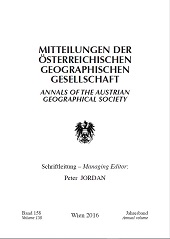 |
Mitteilungen der Österreichischen Geographischen Gesellschaft158. Jg. (Jahresband), Wien 2016
|
|
epub.oeaw – Institutionelles Repositorium der Österreichischen Akademie der Wissenschaften epub.oeaw – Institutional Repository of the Austrian Academy of Sciences
A-1011 Wien, Dr. Ignaz Seipel-Platz 2
Tel. +43-1-515 81/DW 3420, Fax +43-1-515 81/DW 3400 http://epub.oeaw.ac.at, e-mail: epub@oeaw.ac.at |
|
||||||||||||||||||||
|
DATUM, UNTERSCHRIFT / DATE, SIGNATURE
BANK AUSTRIA CREDITANSTALT, WIEN (IBAN AT04 1100 0006 2280 0100, BIC BKAUATWW), DEUTSCHE BANK MÜNCHEN (IBAN DE16 7007 0024 0238 8270 00, BIC DEUTDEDBMUC)
|

